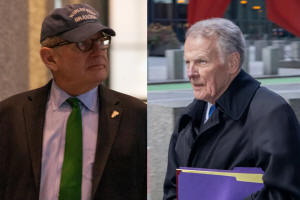Prosecution rests in Madigan trial as defense calls witness dropped from
feds’ list
 Send a link to a friend
Send a link to a friend
 [December 20, 2024]
By Hannah Meisel [December 20, 2024]
By Hannah Meisel
CHICAGO – After calling 50 witnesses over the last two months,
prosecutors in former Illinois House Speaker Michael Madigan’s federal
corruption trial rested their case Wednesday, followed immediately by
defense attorneys calling their first witness.
Lawyers for Madigan’s close friend and co-defendant, longtime Statehouse
lobbyist Mike McClain, called a witness the government dropped off its
own list last week: retired AT&T Illinois lobbyist Steve Selcke.
Prosecutors had closed out their case detailing a 2017 episode in which
AT&T hired newly retired Democratic state Rep. Eddie Acevedo as a
consultant while the company was pushing for major legislation. The feds
allege Acevedo’s $22,500 no-work contract was meant as a bribe to
Madigan in exchange for the powerful speaker’s help pushing the
legislation through the General Assembly.
But Selcke insisted neither he nor any of his colleagues believed hiring
Acevedo had any bearing on the passage of a bill AT&T had been working
on for the last six years, except to prevent against “rocking the boat”
with Madigan’s office.
Selcke gave essentially the same testimony in September at the separate
bribery trial of former AT&T Illinois president Paul La Schiazza, which
ended in a deadlocked jury. After prosecutors last week handed over the
list of the remaining witnesses they intended to call in the case,
Madigan attorney Dan Collins told U.S. District Judge John Blakey that
Selcke’s absence from the list was “not a shock” and that defense
lawyers had subpoenaed him instead.

In the few hours Selcke was on the witness stand Wednesday, the former
lobbyist took jurors through the same events they’ve now heard about
three times.
In 2017, Illinois and California were the only two states that still had
1930s-era laws on their books requiring AT&T to maintain its aging
copper landline network as the “carrier of last resort,” or COLR. AT&T’s
predecessor, the Bell Telephone Company, operated a nationwide monopoly
until its breakup in the 1980s, which obligated the company to provide
landline service everywhere.
But by the early 2010s, landline customers began dropping precipitously
while maintaining the old copper line phone system kept getting more
expensive. An AT&T executive last week testified the company struggled
to find spare equipment on eBay, as the manufacturers had long since
gone out of business or stopped making replacement parts.
AT&T adopted a national strategy to get COLR laws off the books in the
21 states that had adopted the requirements from the 1934 Federal
Communications Act. The company argued doing so would allow it to invest
more in wireless and internet infrastructure, bringing parity with peers
who weren’t beholden to COLR laws.
Selcke noted the Illinois team’s attempts had failed in 2011, 2013 and
2015, though the company did have a legislative victory in 2015 that he
believed signaled Madigan was becoming more open to the idea of full
COLR relief.
And in February 2017, Selcke was proven right when the powerful speaker
accepted a meeting with labor leaders to discuss COLR, at least through
the lens of preserving union jobs. On the same day Selcke and his
colleagues received word about Madigan’s agreement to a meeting, one of
AT&T Illinois’ other two internal lobbyists received an email from
McClain asking if there was “even a small contract for Eddie Acevedo.”
At the time, Acevedo was newly retired from 20 years in the Illinois
House and looking for lobbying and consulting work along with his sons.
Two days later, La Schiazza emailed AT&T Illinois’ executive team,
saying he’d just spoken to McClain, who told him that Madigan had
assigned him the COLR relief bill as a “special project.”
[to top of second column]
|

Longtime Statehouse lobbyist Mike McClain and former Illinois House
Speaker Michael Madigan are pictured in file photos outside of the
Dirksen Federal Courthouse in Chicago. The pair are codefendants in
a public corruption trial. (Capitol News Illinois photos by Andrew
Adams)

“Game on,” La Schiazza wrote in his update.
Selcke on Wednesday said he viewed that as a “positive development” for
COLR, having known McClain since the late 1970s while Selcke was a
staffer for House Republicans and McClain was a Democratic leader of the
House before his decades as a lobbyist. Selcke told the jury what it’s
now heard dozens of times over the course of trial: McClain was close to
Madigan and was viewed as the powerful speaker’s emissary.
But it wasn’t until more than two months later that Selcke and his
colleagues were able to offer Acevedo a nine-month consulting contract,
which he initially turned down in a contentious meeting. Selcke said
Wednesday that he remembered Acevedo being insulted by the
$2,500-per-month offer, though he ultimately accepted.
“Did you at any time think that in exchange, that would result in
Speaker Madigan allowing COLR to pass?” McClain attorney John Mitchell
asked Selcke Wednesday.
“I did not have the feeling that that would result in the speaker
allowing passage,” Selcke answered.
“Did any of your colleagues ever tell you that they intended to trade a
$2,500-a-month job offer to Acevedo in exchange for Speaker Madigan’s
allowing for passage of the COLR relief bill?” Mitchell asked.
“No,” Selcke said.
Mitchell showed Selcke emails in which he and his colleagues discuss
“getting credit” for fulfilling McClain’s request and achieving the
“ultimate objective.” Selcke said he and his colleagues only wanted to
put La Schiazza in a position to go back to McClain to say they’d found
something legitimate for Acevedo to do, though the former lawmaker never
actually wrote the Latino Caucus-focused report he was supposedly hired
to complete.
Selcke said he was “not aware of” anyone ever suggesting that McClain
would tell Madigan to kill the COLR bill had AT&T not offered Acevedo a
contract.
He explained Wednesday that a pair of GOP House members had warned that
hiring Acevedo as a lobbyist might hurt AT&T’s hopes for a bipartisan
vote on a COLR bill. At the time, consultants did not need to publicly
register like lobbyists did, which is why Selcke suggested the company
retain Acevedo as a consultant instead.

Madigan attorney Todd Pugh also asked Selcke whether there was a
connection between Acevedo’s contract and COLR’s eventual passage.
“In my mind, it didn’t have any impact on our responsibility and effort
to go get votes relative to the bill,” Selcke said. “It did have some
degree of tangential impact because we didn’t want to rock the boat with
the speaker’s office.”
Selcke’s testimony will continue Thursday on the trial’s last scheduled
day before the jury is seated again on Jan. 2.
Capitol News Illinois is
a nonprofit, nonpartisan news service that distributes state government
coverage to hundreds of news outlets statewide. It is funded primarily
by the Illinois Press Foundation and the Robert R. McCormick Foundation. |